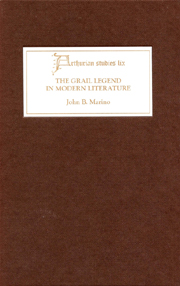Book contents
3 - Humanism and the Grail Legend: From Skepticism to Metaphor
Published online by Cambridge University Press: 12 September 2012
Summary
Aside from its transformation by way of the origin controversy, the Grail has also undergone a process of secularization in British and American fiction. In various ways, the legend has been removed from its position of transcendent otherworldliness to a position more applicable to worldly experience. This transformation is a consequence of the increasing influence of secular humanism throughout the twentieth century and growing skepticism in regard to the sacred. The scientific developments of the nineteenth and twentieth centuries promoted a faith primarily in humanity rather than the divine. According to secular humanism, which developed alongside scientific advancements, we, and not a transcendent deity, must solve our own problems on earth. Modern intellectual developments continued the ideas of the eighteenth-century Enlightenment, which claimed that science and reason can free us from irrationality (such as superstitious religion), enable us to understand the world and teach us to place our faith in humanity, rather than in theological constructs (Berman 3–4, Harvey 12–13). Heaven became more and more irrelevant. Then two world wars and the resulting destruction decreased faith in humanity and increased disillusionment with the idea of a benevolent deity involved in human affairs. David Harvey in The Condition of Postmodernity: An Enquiry into the Origins of Cultural Change (1989) explains how twentieth-century devastation and fear of further devastation on account of war and nuclear force led to rejection of optimistic faith in humanity's ability to use reason in a benevolent manner (12–13).
- Type
- Chapter
- Information
- The Grail Legend in Modern Literature , pp. 82 - 116Publisher: Boydell & BrewerPrint publication year: 2004



